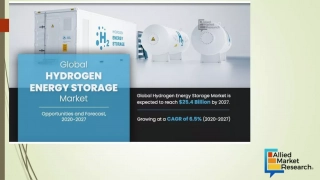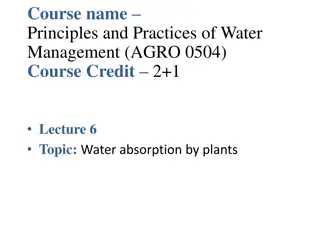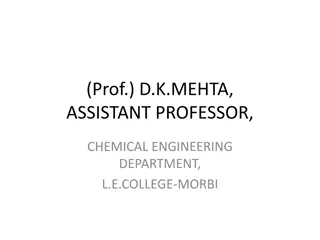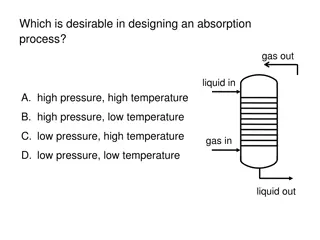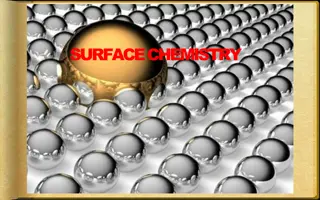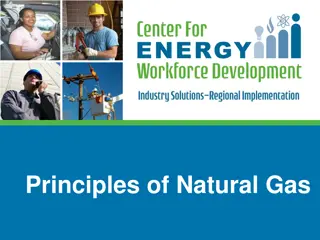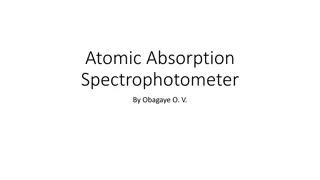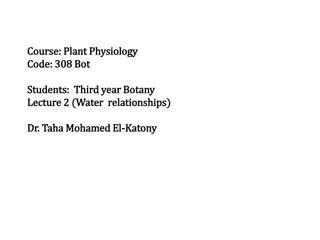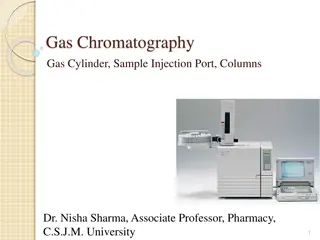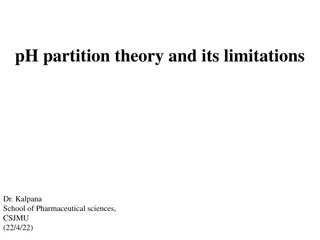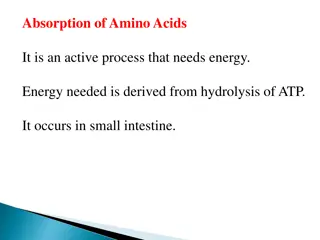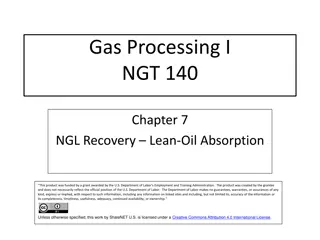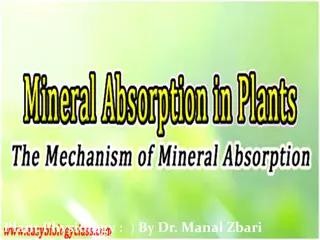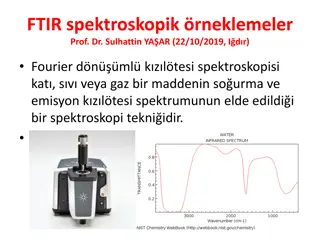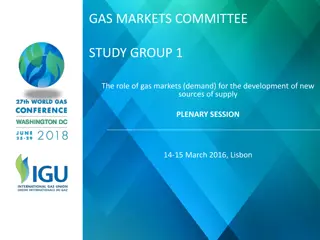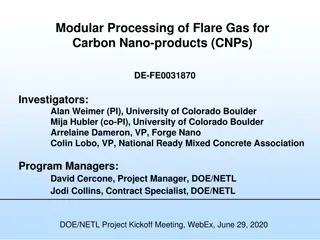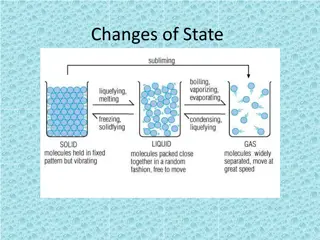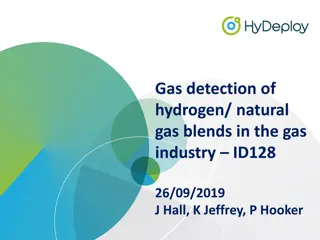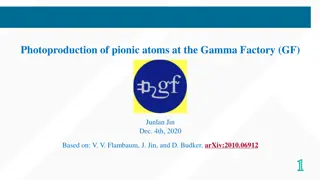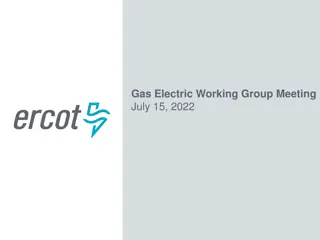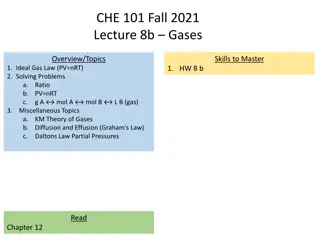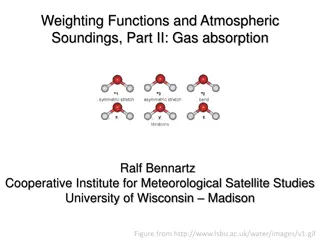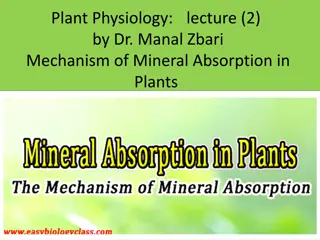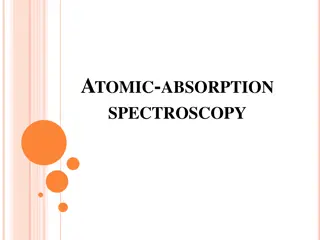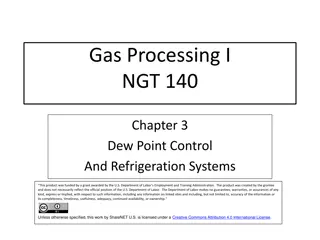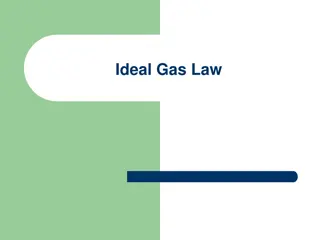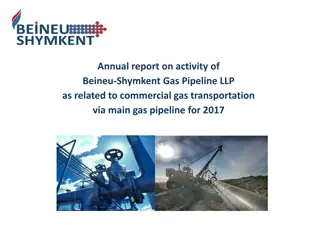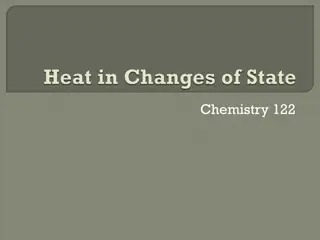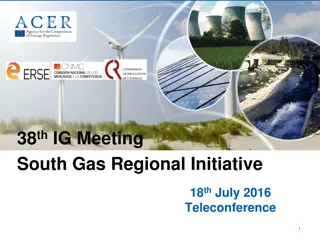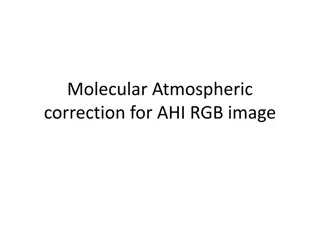Hydrogen Energy Storage Market
Hydrogen is produced through electrolysis of water and the gas is stored in medium or large sized containers according to the requirements. The gas can be converted into energy in combustion engine or in fuel cell. Usually, hydrogen energy is stored in three form; liquid, solid, and gaseous form. To
2 views • 6 slides
Gas meters market
A gas meter is driven by the force of the moving gas in the pipe. Each time the dial with the lower value complete one revolution, the pointer on the next higher value dial moves ahead one digit. These meters are essential for ensuring adequate gas pressure from the main supply of natural or liquefi
2 views • 6 slides
Applications of Heat Exchangers in Various Industries
This topic delves into the diverse applications of heat exchangers in different industries and plants, elucidating the use of various types of heat exchange systems and their importance in processes like bio-processing, power generation, and more. The lecture covers heat exchange applications for li
0 views • 24 slides
ASPEN Staged Separation Unit-Ops
Introduction to Aspen Staged Separation Unit Operations for the purification of desired components by removing impurities and pollutants using distillation, absorption, and stripping columns. This technology is relevant to ammonia synthesis to prevent catalyst poisoning by removing CO2 through absor
0 views • 26 slides
Understanding Water Absorption in Plants: Mechanisms and Implications
Exploring the intricate process of water absorption in plants, this course delves into the active and passive methods used by roots to uptake water from soil, the role of osmosis in osmotic active absorption, the influence of transpiration on passive absorption, and the significance of root hairs in
1 views • 26 slides
Gas-Liquid Equipment in Mass Transfer Operations
Gas-liquid operations play a crucial role in mass transfer processes by facilitating intimate contact between the two fluids for efficient interphase diffusion. Various equipment such as sparged vessels (bubble columns) and mechanically agitated vessels are used to disperse gas or liquid phases, pro
2 views • 27 slides
Understanding Absorption Processes and McCabe-Thiele Analysis
Desirable conditions in designing an absorption process include low pressure and high temperature for the gas in and liquid out. Learn about appropriate plots, points on the operating line, absorption factors, minimum absorbent usage, assumptions in McCabe-Thiele analysis, and differences between co
3 views • 14 slides
Understanding Surface Chemistry and Adsorption Processes
Surface chemistry is the study of processes at the interface of two bulk phases, such as liquid-liquid interactions. Adsorption and absorption are key phenomena where atoms, ions, or molecules adhere to surfaces or enter bulk phases. The accumulation of molecular species at the surface, known as ads
1 views • 28 slides
Understanding Natural Gas: Properties, Dangers, and Safety Measures
Explore the principles of natural gas, its chemical composition, properties, and potential dangers. Learn about gas formation, extraction, and usage. Discover how to manage gas leaks, prevent ignition, and ensure safety in handling natural gas. Gain insights into flammability, static electricity ris
0 views • 15 slides
Understanding Absorption Costing and Overhead Absorption in Cost Accounting
Absorption costing is a method that includes direct costs and a fair share of production overhead costs in the cost of a product. Overhead absorption rate (OAR) is calculated using budgeted figures and can lead to over/under-absorption. Over-absorption occurs when absorbed overhead is more than actu
1 views • 23 slides
Understanding Atomic Absorption Spectrophotometry in Analytical Chemistry
Atomic absorption spectrophotometry (AAS) is a spectro-analytical technique used for quantitative determination of chemical elements through the absorption of light by free atoms. This method is vital in various fields like biophysics, toxicology, and archaeology, allowing the analysis of over 70 di
0 views • 9 slides
Understanding Water Absorption in Plant Root Systems
Absorption of water by plant roots is a crucial process involving osmosis and gradients. The root system structure plays a vital role in water absorption efficiency, with root hairs being key to this process. Factors such as soil penetration depth and root hair characteristics impact the extent of w
0 views • 21 slides
Gas Chromatography Equipment Overview: Components and Functions
Gas chromatography involves various components like gas cylinders, sample injection ports, and columns. The gas cylinder serves as a carrier gas reservoir with a pressure regulator. Sample introduction is through a column inlet/sample port injector. The GC injection syringe helps vaporize samples qu
0 views • 16 slides
Understanding Biopharmaceutics: pH Partition Theory and Drug Absorption
Biopharmaceutics explores how drug properties and administration methods impact drug absorption. Factors affecting oral absorption include membrane physiology and drug partitioning based on pH levels. The pH partition theory, explained by Brodie et al., highlights the role of drug lipid solubility a
0 views • 9 slides
Amino Acid Absorption Mechanisms in Small Intestine
Amino acid absorption in the small intestine is an active process requiring energy derived from ATP hydrolysis. It involves two main mechanisms: carrier proteins transport system and glutathione transport system. The carrier proteins transport system uses ATP energy for absorption, while glutathione
0 views • 18 slides
Best Gas Dryer Services in Bickford Park
If you want the Best Gas Dryer Services in Bickford Park, visit AG Gas Solutions. They specialize in a wide range of services including gas stove repair, gas ranges, gas ovens, gas dryers, gas BBQs, gas pizza ovens, gas fire pits, pool heaters, dryer
1 views • 6 slides
Lean Oil Absorption Process in Gas Processing
The Lean Oil Absorption process in gas processing involves using hydrocarbon-rich lean oil to absorb heavier hydrocarbons from natural gas, allowing for increased gas condensate recovery. This method is a cost-effective way to separate different products in natural gas, alongside refrigeration proce
1 views • 14 slides
Understanding Fermi Liquid Theory in Interacting Fermion Systems
Fermi liquid theory, also known as Landau-Fermi liquid theory, is a theoretical model that describes the normal state of metals at low temperatures. Introduced by Landau and further developed by Abrikosov and Khalatnikov, this theory explains the similarities and differences between interacting ferm
0 views • 23 slides
Mineral Absorption in Plants: Mechanisms and Types
Plants absorb minerals from the soil as ions through the roots, with the process of mineral absorption being distinct from water absorption. Mineral absorption in plants can occur through passive or active methods, each involving different mechanisms and energy requirements. Passive absorption is a
0 views • 14 slides
Fourier Transform Infrared (FTIR) Spectroscopy Examples by Prof. Dr. Sulhattin YAŞAR
Fourier Transform Infrared (FTIR) spectroscopy is a technique used to obtain the absorption and emission spectra of solid, liquid, or gas substances. This content provides characteristic absorption peaks for various functional groups, such as alkane, alkyl, alkenyl, alkynyl, aromatic compounds, alco
0 views • 15 slides
Gas Markets Committee Study Group: Fueling the Future with Gas
The Gas Markets Committee Study Group 1 focuses on analyzing the role of gas markets in driving the development of new sources of supply, studying gas demand globally and in selected countries, and projecting gas supply up to 2040. The group discusses gas demand drivers, shares work progress through
0 views • 9 slides
Sustainable Conversion of Flare Gas into High-Value Carbon Nano-products
This project focuses on modular processing of flare gas to produce carbon nano-products, aiming to address the challenges of natural gas flaring in the United States. With a three-year timeline and a total budget of $3,750,000, the interdisciplinary team led by the University of Colorado Boulder see
0 views • 36 slides
Understanding Changes of State in Matter
Changes of state in matter refer to the physical transitions that substances undergo, such as melting, freezing, vaporization, and condensation. These transitions involve the addition or removal of energy, impacting the movement of particles and their arrangement. Despite the transformations, the id
0 views • 10 slides
Gas Detection of Hydrogen/Natural Gas Blends in the Gas Industry
Gas detection instruments play a crucial role in assessing the presence of hazardous atmospheres in the gas industry. This study focuses on the impact of adding hydrogen up to 20% in natural gas blends on gas detection instruments. The aim is to understand any potential inaccuracies in readings and
0 views • 30 slides
Photoproduction of Pionic Atoms at the Gamma Factory: Research Overview
Research conducted by V. V. Flambaum, J. Jin, and D. Budker at the Gamma Factory (GF) on photoproduction of pionic atoms is detailed in this content. It explores the formation of pionic atoms with negative pions orbiting the nucleus in a hydrogen-like system, emphasizing strong interaction effects a
0 views • 11 slides
Gas-Electric Working Group Meeting Highlights - July 15, 2022
Gas-Electric Working Group meeting on July 15, 2022, discussed topics including Antitrust Admonition, Gas Industry Changes under new Texas RRC Regulations, Critical Designation of Natural Gas Infrastructure, Supply Chain Mapping, Gas-Electric Load Coordination Process, and introduction of James Stev
0 views • 21 slides
Comprehensive Overview of Ideal Gas Law and Gas Problems
Delve into a detailed exploration of the Ideal Gas Law and its applications in solving various gas-related problems. Master the concepts of Boyle's Law, Charles's Law, Avogadro's Law, and more through equation, ratio, and stoichiometry problems. Enhance your understanding of gas behavior and calcula
0 views • 20 slides
Gas Absorption and Atmospheric Soundings: Principles and Applications
Gases in the atmosphere absorb radiation through various mechanisms such as changing rotational/vibrational energy and exciting electrons. This absorption plays a crucial role in remote sensing applications. The absorption principles differ for molecules like CO2 and H2O, influencing their vibration
0 views • 9 slides
Mechanism of Mineral Absorption in Plants: Active vs Passive Methods
Plants absorb minerals from the soil in the form of inorganic ions through both passive and active methods. Active mineral absorption requires metabolic energy, whereas passive absorption occurs along the concentration gradient by simple diffusion. The roots play a vital role in mineral absorption d
0 views • 14 slides
Understanding Surface Chemistry and Adsorption Phenomena
Surface chemistry is a crucial branch of chemistry that focuses on the chemical processes occurring at interfaces between different surfaces like solid-liquid, solid-gas, and liquid-gas. This field plays a significant role in various industries, including electronics. Adsorption, absorption, and sor
0 views • 15 slides
Understanding Mixtures: Types and Examples
A mixture is a combination of different ingredients that can be separated. There are various types of mixtures such as liquid solutions, solid solutions, and gas solutions. Liquid solutions involve solid substances dissolved in a liquid, like sugar in water, while solid solutions include metal alloy
0 views • 15 slides
Understanding Atomic Absorption Spectroscopy in Analytical Chemistry
Atomic absorption spectroscopy (AAS) is a valuable technique for determining metal concentrations in samples. This method involves the absorption of light to measure gas-phase atoms, requiring steps like desolvation, vaporization, and volatilization to convert samples into atomic gas. The process ut
0 views • 18 slides
Gas Processing: Dew Point Control and Refrigeration Systems
Gas processing involves gathering raw gas from wells, passing it through various units like feed gas receiving, condensate stabilization, gas treating, dew point control, and refrigeration units to control liquid condensation and recover natural gas liquids. Dew point control helps prevent condensat
0 views • 26 slides
Understanding the Ideal Gas Law in Chemistry
Exploring the concept of the Ideal Gas Law, its derivation from the combined gas law, conversion of pressures, practical applications through problem-solving examples, and the significance of the gas constant (R) in calculations. Learn how to use the Ideal Gas Law formula (PV = nRT) to solve for var
1 views • 19 slides
Gas Laws Review Game - Test Your Knowledge on Gas Concepts and Mixed Gas Laws
Get ready to test your knowledge on gas concepts and mixed gas laws with this interactive review game. Answer questions on gas properties, volume changes, pressure variations, and more. Challenge yourself and your team members as you solve problems related to gas laws. Improve your understanding and
0 views • 7 slides
Annual Report on Activity of Beineu-Shymkent Gas Pipeline LLP for Gas Transportation in 2017
The annual report highlights the commercial gas transportation activities of Beineu-Shymkent Gas Pipeline LLP in 2017. It provides general information on the project, technical parameters of the gas pipeline, and a diagram of the Beineu-Bozoy-Shymkent Gas Pipeline. The report also includes details o
0 views • 14 slides
Understanding Heat Transfer in Phase Changes of Water
Water molecules exhibit different behaviors in the liquid and gaseous states due to varying attractions between molecules. To change liquid water to a gas, energy must be added to overcome intermolecular forces, making this process endothermic. The heat absorbed during melting is equal to the heat r
0 views • 22 slides
Meeting Summary: Interoperability and Gas Quality in Gas Regional Initiative
Discussion highlights from the 38th IG Meeting of the South Gas Regional Initiative teleconference held on July 18, 2016. Focus on interoperability, latest developments, and next steps in the region. Key topics include Interconnection Agreement requirements, gas flow control, gas quantity allocation
0 views • 24 slides
Near-UV Satellite Observations for Retrieving Aerosol Properties
Near-UV satellite observations offer a valuable method for retrieving aerosol properties, including aerosol optical depth, absorption, layer height, and surface albedo. These observations provide advantages like sensitivity to aerosol properties and negligible gas absorption interference. However, c
0 views • 16 slides
Atmospheric Correction Techniques for Satellite Image Enhancement
Atmospheric correction is essential for improving the quality of Remote Sensing images captured by satellites. This process involves correcting for the effects of atmospheric gases such as scattering and absorption on the measured Top-of-Atmosphere (TOA) reflectance. Techniques like molecular correc
0 views • 8 slides
